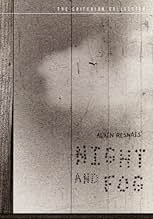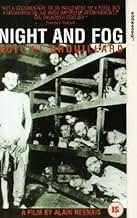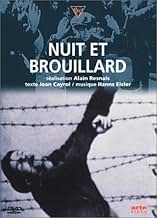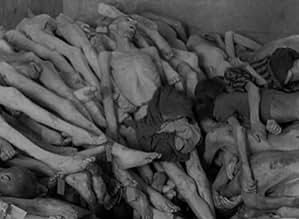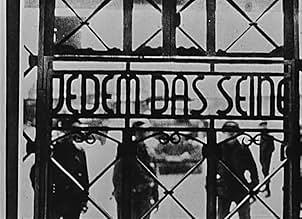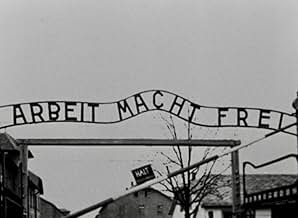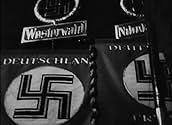I campi di concentramento dei Nazisti e l'infernale mondo della disumanizzazione e la morte contenuta al suo interno.I campi di concentramento dei Nazisti e l'infernale mondo della disumanizzazione e la morte contenuta al suo interno.I campi di concentramento dei Nazisti e l'infernale mondo della disumanizzazione e la morte contenuta al suo interno.
- Nominato ai 1 BAFTA Award
- 2 vittorie e 1 candidatura in totale
- Narrator
- (voce)
- (non citato nei titoli originali)
- Self
- (filmato d'archivio)
- (non citato nei titoli originali)
- Self
- (filmato d'archivio)
- (non citato nei titoli originali)
- Self
- (filmato d'archivio)
- (non citato nei titoli originali)
- Self
- (filmato d'archivio)
- (non citato nei titoli originali)
Trama
Lo sapevi?
- QuizIn the DVD re-release, there is a subtle but controversial difference in one of the still photographs of a Nazi concentration camp in southern France. In this version the distinctive profile of a French gendarme can be seen at one of the camps, implying that the French Vichy government of the time was aware of and perhaps involved in the management of the camps. This same photograph appears in the original version but the gendarme's profile was obscured at the insistence of the French government (who commissioned the film) when the film was in post-production.
- BlooperIn the film a popular myth about the Third Reich is presented as fact: The claim that the body fat of prisoners in extermination camps was used to produce soap. Though evidence does exist of small-scale soap production, possibly experimental, in the camp at Stutthof concentration camp near Danzig/Gdansk, mainstream scholars of the Holocaust consider the idea that the Nazis manufactured soap on an industrial scale to be part of World War II folklore.
- Citazioni
Récitant/Narrator: With our sincere gaze we survey these ruins, as if the old monster lay crushed forever beneath the rubble. We pretend to take up hope again as the image recedes into the past, as if we were cured once and for all of the scourge of the camps. We pretend it happened all at once, at a given time and place. We turn a blind eye to what surrounds us and a deaf ear to humanity's never-ending cry.
- Versioni alternativeBefore its original release, there was a still of a French gendarme (policeman) watching a roundup at Pithiviers. He is easily recognizable by the characteristic French "kepi." Wanting to deny complicity, French censors insisted this shot not be allowed, so for its original release, the image was altered so that a wooden beam covered the gendarme and his kepi. In 1997 or 98, the original version of the film was re-released in France, finally revealing the gendarme. The original American release of the film did not translate all the dialogue for the subtitles, in particular leaving out one of the two references to Jews: "Annette, from Bordeaux." Subsequent releases restored the original text: "Annette, a Jew from Bordeaux."
- ConnessioniEdited from I campi di concentramento nazisti (1945)
It was so difficult for me to sit through that I was tempted to shut the DVD player off three times, but I told myself, "No, this is important. It has to be seen, if only as a reminder of what can happen when an inhuman world-view is fused to state-of-the-art technology." The Holocaust was far more (and worse) than simple mass-killing, awful as that is. It was a business decision, coolly and scientifically calculated, to destroy millions of innocents while reaping a profit from them- in death as well as in life.
The sight of the starved, broken bodies, the ghastly scenes taken in the medical labs in the death camps, the sight of little children being led by the hand to their last train ride. It is all so monstrous as to be indescribable.
I am glad I watched it. But I do not think that I'll be watching it ever again, and I give it a 10. It affected me that deeply.
- Jordan_Haelend
- 19 gen 2005
- Permalink
I più visti
Dettagli
- Tempo di esecuzione32 minuti
- Colore
- Mix di suoni
- Proporzioni
- 1.37 : 1
Contribuisci a questa pagina


